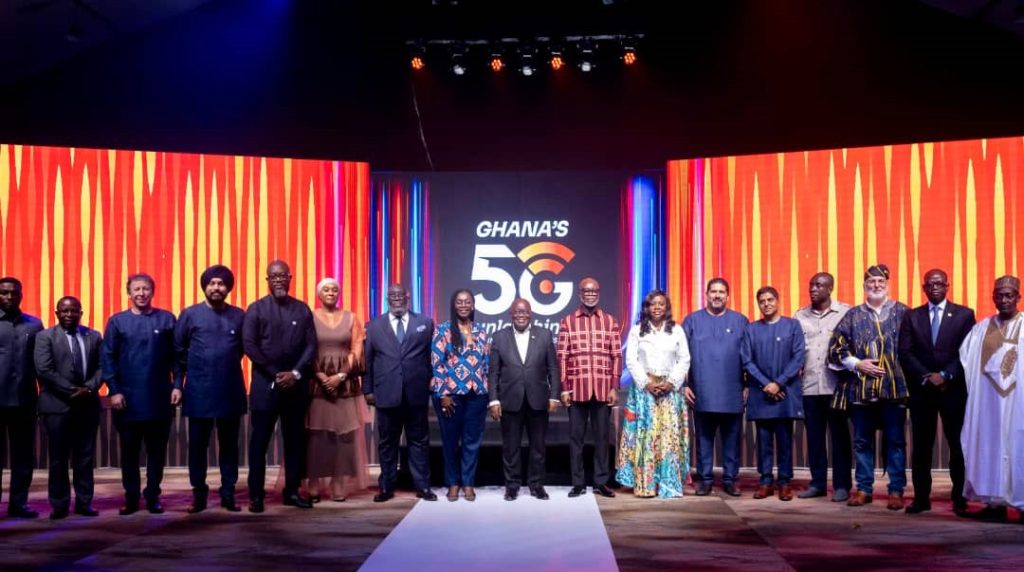Accra, Nov. 2, GNA – The Minister for Communications and Digitalisation, Ursula Owusu-Ekuful, has reiterated the government’s commitment to ensuring that all Ghanaians regardless of their location benefit from fifth generation of wireless technology (5G) services.
She said as part of the rural inclusion strategy, the government had developed an initiative to subsidise infrastructure costs in underserved areas.
“We are working with our partners to leverage satellite and wireless solutions, which are often more feasible for rural deployment. Our Universal Service Fund, managed by GIFEC, is now largely dedicated to rural connectivity projects, reinforcing our commitment to digital equity,” she said at the launch of Ghana’s 5G service.
This approach will deliver fast, reliable 4G and 5G services to communities that have traditionally faced connectivity challenges.
Owusu-Ekuful said the adoption of a shared network model for the rollout of 5G was to ensure the spread of affordable 5G connectivity across the country.
She said the shared network would allow operators to deliver high-speed internet services without incurring the substantial capital costs of infrastructure development, which the government expected would keep 5G services within the reach of ordinary Ghanaians.
Under the shared network model, mobile network operators the Minister posited, will lease capacity from Next Generation Infrastructure Company (NGIC) thereby sharing network operational costs rather than each investing in separate builds.
“Affordability of the 5G network is another reason why we chose the shared network model, the network operators are the ones who will be delivering or transmitting the service to their subscribers and they do not have to worry about the capital expenditure costs of actually building the network, because it has already been built.
expenditure, and so that in itself should be able to deliver cost savings to the end-user who is the subscriber,” she remarked.
She said the NCA was working with NGIC to ensure a broad selection of 5G packages tailored to varying levels of usage and affordability for Ghanaians.
“The potential of 5G extends beyond mere incremental improvements; it is a revolutionary leap forward that promises to redefine connectivity, productivity, and overall quality of life,” she said.
“With its unparalleled speed, low latency, and enormous capacity, 5G has the potential to drive innovations in every sector—agriculture, health, transport, manufacturing, and beyond. The Internet of Things (IoT), artificial intelligence (AI), and smart cities are no longer futuristic concepts but imminent realities ready to transform our ways of living and working,” she added.
The initial rollout focus is on major cities, starting in Accra, Kumasi, and Takoradi where residents will begin experiencing the benefits almost immediately; once the network operators activate it.
The goal is to achieve coverage across additional urban areas by the end of 2024. For full nationwide coverage, including rural regions, government and partners are looking at a multi-phase approach, aiming for comprehensive access by 2026.
“This timeline ensures a methodical deployment that aligns with infrastructure readiness and quality assurance,” the Minister said.
On data security concerns, the Minister said issues of cybersecurity, data privacy, and equitable access were being addressed head on.
“Our commitment to sustainable and inclusive growth has motivated us to build a robust framework that safeguards our digital future. Data privacy and security are critical components of our digital strategy,” she said.

Owusu-Ekuful said the government was implementing stringent data protection protocols aligned with international standards to safeguard user information as 5G becomes widely available, including end-to-end encryption and advanced cybersecurity measures to protect against potential breaches.
Additionally, the government was working with industry experts to continuously monitor network security, ensuring that any emerging threats are quickly addressed.
“We aim to build a trusted digital environment where Ghanaians can fully benefit from 5G while feeling secure about their data,” she added.
The fifth generation of wireless technology, 5G, promises significantly higher internet speeds, faster data transfers, and improved network reliability compared to previous generations.
It is expected to deliver up to 10 times the speed of 4G Plus services, marking a major upgrade in connectivity. Enhanced capacity and lower latency will enable faster downloads and more consistent performance across industries.
The initiative, designed to provide affordable high-speed mobile broadband across Ghana, is expected to drive digital transformation, particularly in areas such as healthcare, education, and financial services.
Next Gen InfraCo (NGIC) has been granted exclusivity for 10 years to enable them invest in rolling out the 4G/5G infrastructure nationwide in the shortest possible time, for all network operators to use to deliver services to their subscribers to create an even playing field and encourage them to compete fairly, not on network rollout, but on service offerings.
The 5G license has been awarded to NGIC, a newly created shared infrastructure company co-promoted by the government and a consortium of firms, including Ascend Digital, K-NET, Radisys, Nokia, Tech Mahindra, AT Ghana, and Telecel Ghana.
The collaborative effort is expected to deliver cost-effective 5G services across the country, ensuring broader access to next-generation mobile connectivity.
GNA